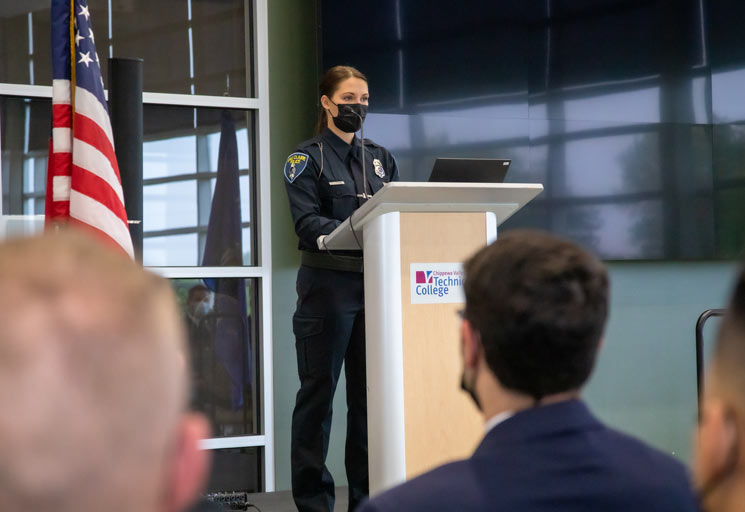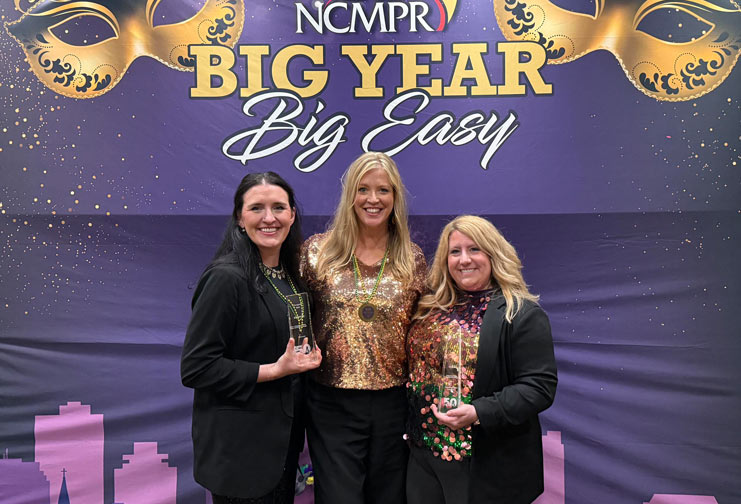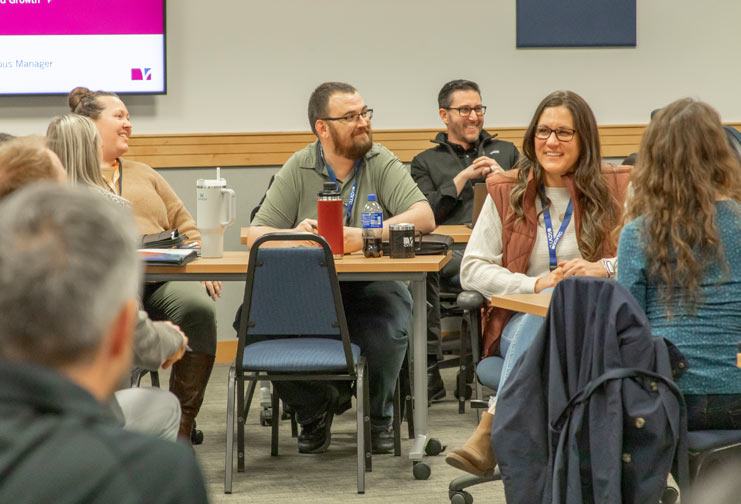Thursday, October 7, 2021
CVTC Grads Are Ready To 10-41 (Begin Duty)

Ariana Down Larson gives a heartfelt speech about time with her fellow Law Enforcement Academy graduates.
Logan Bauer likely blushed when Eric Anderson called him a “physical specimen” in front of a crowd of nearly 120 people during Chippewa Valley Technical College’s Law Enforcement Academy graduation on October 7.
Anderson, criminal justice director for CVTC, awarded Bauer for his exemplary fitness test during the summer academy.
Bauer, having the top score in his class for the 300 meters, vertical jump, push-ups, agility run and the mile and a half run, will be a fine addition to any law enforcement agency, Anderson said. Since all officers are required to complete the academy, Bauer, 22, originally from Durand, is ready to start his career in law enforcement.
Bauer knows some people may question why he’s entering the law enforcement field – especially during the current climate and criticism of people in the career.
But Bauer also knows, like himself, people genuinely dedicated to the profession will push through, get their degrees and use their skills to serve and protect.
“Now more than ever, it’s important that we change those perceptions,” he said. “We have to sit down and have conversations. We need to build those partnerships and trust in the community. Let’s change the perception of people who may not have a fond perception of law enforcement.”
Bauer, Zachary Joyce, and Ariana Down Larson are three of 20 students who graduated from Chippewa Valley Technical College’s Law Enforcement Academy Thursday. Each year the college offers three law enforcement academies, two jail academies and graduates about 100 students.
Anderson said even though all of these students have college credits of some sort – and many of them in criminal justice – the law enforcement academy is solely focused on context, scenario-based education and assessment.
“They are brand new, and they really haven’t had any experience in this regard, so we have a uniform requirement, a policy manual and they have to wear a duty belt daily to class,” Anderson said of some of the requirements. “It’s more structured, there are rules and it’s a full eight-hour day, Monday through Friday.”
Anderson also acknowledges the challenge for law enforcement right now.
“It’s the elephant in the room, and it’s not something we will avoid. It’s something they have to know about,” he said. “They have to expect to have some adversity, but they can’t get caught up in it.”
Academy students should be able to articulate what drives them to become an officer. Do they desire to serve the community and be a servant to the people? Anderson said students’ intent gives him a good idea if they are getting into the profession for the right reason.
And thankfully, Anderson doesn’t meet many students who get this far and don’t have compassion, understanding and the drive to protect.
Each academy graduate is high achieving, including Bauer’s classmates Joyce and Down Larson. Joyce, who graduated from Elmwood High School, was chosen as a squad leader in the academy and secured a position with the Chippewa Falls Police Department before graduation.
“I finally made the choice to get into law enforcement because I felt as if it would fit best with my mindset,” Joyce said. “I have a drive for physical fitness, having pride in what I do and how I carry myself and helping those in need.”
Before deciding to enter law enforcement, Joyce, 25, joined the Marine Corps in San Diego. He spent four years on active duty with the 2/6 unit.
“While I was there, I learned exactly who I wanted to be and what type of a leader I wanted to be,” he said.
That drive is why Chippewa Falls Police Chief Matthew Kelm chose Joyce as the department’s newest recruit. Before hitting the streets of Chippewa Falls with a field training officer, Joyce experienced the department’s training and evaluation with the in-house tactical trainers.
Kelm said he’s thankful for colleges like CVTC that offer the academy.
“Many of our officers are CVTC graduates,” he said. “The law enforcement academy provides prospective officers with the necessary street-level, hands-on training of doing actual police work. The academy is very challenging with high entry and graduation standards. Future officers are trained and tested both physically and mentally, focusing on teamwork, positive attitude and decision-making under pressure.
“Students who graduate are well-trained and prepared for the difficult but very rewarding job of being a police officer.”
Down Larson, 20, of Menomonie, is ready for her future with Eau Claire Police Department. She was the class speaker during the event and expressed her appreciation for her classmates and her education at CVTC.
“It was apparent to our class that you wanted us to be successful in our careers,” she said, addressing instructors. “As a class, we wouldn’t be here today without the help, guidance and teaching.”
Down Larson also expressed gratitude to her fellow graduates and their families.
“I think everyone can agree with me: We have truly become a small, tight-knit family. We have created so many memories together,” Down Larson said. “After today, we will respond to horrific tragedies, domestics, car crashes, civil disputes and many more. It’s important to remember the people who stand here with you today. Please lean on each other throughout your careers.”
Down Larson knew she wanted to go into criminal justice during her senior year of high school. She went on a couple of ride-alongs with the Dunn County Sheriff’s Department and “tagged along with a search warrant in Chippewa County.” She also spent a day with a Homeland Security Agent in the Twin Cities.
“After all of these experiences, I instantly knew that law enforcement was the career for me,” she said. “I wanted a job where I could communicate with others, help people, serve and be a part of my community.”
Anderson is proud of CVTC’s law enforcement academy graduates. He cares about them and wants them to succeed – not just now but throughout their career.
“You’re not going to make a million dollars in this job,” Anderson said. “As a matter of fact, you are going to pay for it in many different ways – with family and health issues. It takes a real toll on your body and your mind.
“I know they know what they are signing on for. They have this internal desire to be a servant to their community and accept all drawbacks. It takes a certain kind of person to take that on. I give credit to those who are here.”
Law enforcement officers needed
Eric Anderson, criminal justice director for Chippewa Valley Technical College, said like many service industries, law enforcement agencies are seeing seasoned people leave the profession and fewer people signing on.
Unlike those other service industries, though, the stakes are higher for officers.
“It’s the reality,” Anderson said. “But I’ve seen most of it. I’ve done most of it. And I wouldn’t trade it for anything.”
Anderson said a lot of people run away from a job like this. People ask why others want to be officers or deputies, especially now when the public’s attitude towards law enforcement has turned somewhat negative.
“If everyone threw up their hands and said, ‘I can’t do it, I’m out,’ where would we be,” Anderson asked. “At this moment we’ve had a drop in recruitment. Police departments are struggling every week. I give credit to those who want to be in this profession and power through.”
Matthew Kelm, Chippewa Falls Police chief, said it’s a profession worth fighting for.
“Bottom line, we need more people who want to be police officers. Anyone interested in the field should reach out to their local police agency to talk about the job and sign up for a ride-a-long,” Kelm said.


